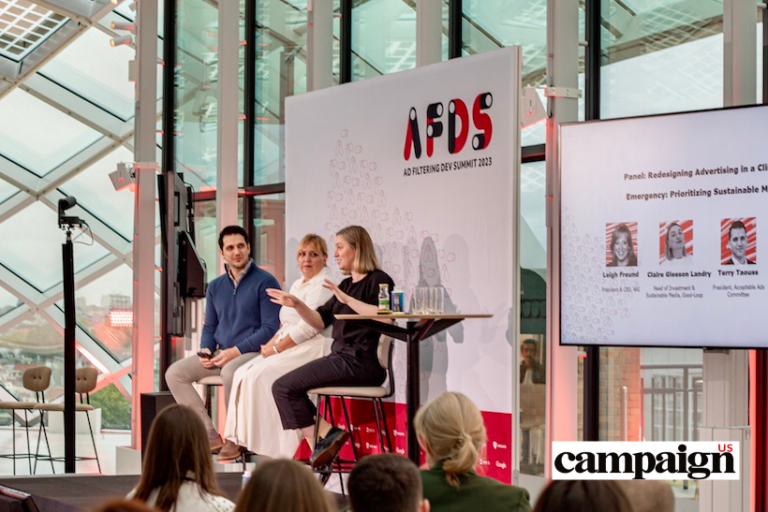
Sustainability and online advertising
In 2023, the Acceptable Ads Committee conducted a qualitative and quantitative study to better understand the perspectives of online users regarding sustainability.
This study addressed key questions, including user awareness of carbon emissions associated with their internet usage, their views on “sustainable advertising” and strategies to reduce carbon footprint.
Key findings
The environmental awareness of online ads is still underestimated.
47% of internet users have some awareness of the impact of online ads on the environment while only 12% report being very aware of their impact. A majority believe online advertising has some impact on the annual carbon emissions associated with internet use.
Users want more info on how to reduce CO2 emissions from online ads and are willing to take action.
68% want more information on how they can reduce their environmental impact from the ads they see online. After being informed of the environmental impact of online advertising, 66% were more willing to take action to reduce its impact.
Users would support an independent governing body that set sustainable online ad standards.
84% of users think that having an independent governing body establish and enforce standards for sustainable advertising would help reduce carbon emissions from online ads and some would be more likely to click on an ad that has been labeled as sustainable.
The qualitative survey findings
Users feel that the responsibility for reducing the environmental impact of online advertising falls primarily on advertising agencies and the brands commissioning the ads.
Participants suggested several ways that brands and agencies could contribute to emissions reductions, such as:
- Implementing formal certifications or compliance standards
- Reducing the no. or types of energy-intensive ad formats
- Requiring advertisers to offset carbon emissions from ads.
Users want the carbon emitted by online ads to be reduced, but most are unable to elaborate on how this can be achieved. Notably, users perceive certain types of ads (primarily video ads, but also interactive ads, animated ads and pop-ups) to be more energy-intensive and therefore negatively impact the environment more.
There is a gap in users’ understanding of the online advertising ecosystem, which suggests that industry stakeholders should collaborate on providing clear information and guidelines for sustainable advertising practices.
Making online advertising more sustainable is difficult given the industry complexity and number of stakeholders involved. The consensus from users was that sustainability initiatives require a united industry effort spearheaded by independent and credible organizations.
While some participants mentioned the need for a governing body or regulator to oversee emissions reduction in online advertising, others were unaware of any existing such bodies. This indicates a potential opportunity for industry associations or organizations to step in and fill this role.

What is needed
A collective agreement on measuring ad carbon emissions
Without reliable data, effective management is difficult. Credible information is the catalyst for transformative actions and behavioral shifts.
Immediate action to kickstart change
The IAB Tech Lab has released a comprehensive starter guide, empowering stakeholders to initiate immediate changes. Brands, agencies, publishers and ad tech companies are eager to make a difference – they need clear directives to commence their sustainability journey.
Active participation and engagement
The true impact of sustainability efforts lies in mobilizing our industry as a unified force. By sharing data, best practices, and collaboration opportunities, we can propel initiatives forward. We encourage your organization to continue to lead the charge and remain at the forefront of this transformative movement.
Spreading the sustainability word
The Acceptable Ads Committee recently held a sustainability panel at the Ad-Filtering Dev Summit 2023 on ‘Redesigning advertising in a climate emergency: Prioritizing sustainable media’, featuring:
- Terry Taouss, President of the AAC
- Leigh Freund, CEO of the NAI
- Claire Gleeson-Landry Head of Investment and Sustainability at Good-Loop
- Justin Wohl, Chief Revenue Officer, Salon.com, Snopes.com and TVTropes.org
'Internet Users Want Sustainability Standards For Digital Ads'
Our sustainability research study exclusive, featured on MediaPost


'Sustainability and digital advertising — ad execs question whether regulation will be required'
This article featured on Campaign US is a coverage of the panel discussion above.
Let's connect
If sustainability is an important initiative within your organization, I encourage you to join our dedicated ‘sustainability working group’. Your participation will help shape future AAC initiatives in this crucial area.

About Acceptable Ads Comittee
Established in 2017, the AAC creates nonintrusive, exceptionally-researched ad standards that respect user experience while delivering real value to content publishers and online advertisers.
Learn more